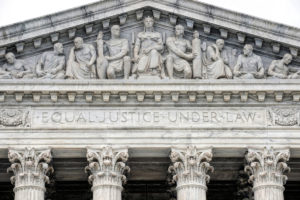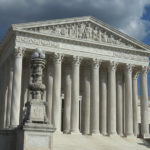In a split decision, the U.S. Supreme Court overturned landmark decisions that affirmed a constitutional right to abortion and instead ruled abortions may be regulated on a state-by-state basis.
As both pro-life groups and abortion rights advocates responded to the court’s ruling, their disparate reactions included one common refrain: “This is not the end.”
The Supreme Court ruled on Dobbs v. Jackson Women’s Health Organization, upholding a Mississippi law that bans most abortions after 15 weeks of pregnancy.
Alito: Roe was ‘egregiously wrong from the start’

Writing for the majority, Justice Samuel Alito rejected both the 1973 Supreme Court ruling in Roe v. Wade and the court’s 1992 ruling in Planned Parenthood v. Casey.
“We hold that Roe and Casey must be overruled,” Alito wrote in a lengthy opinion. “The Constitution makes no reference to abortion, and no such right is implicitly protected by any constitutional provision, including the one on which the defenders of Roe and Casey now chiefly rely—the Due Process Clause of the Fourteenth Amendment.”
Until the latter part of the 20th century, the right to abortion “was entirely unknown in American law,” Alito continued. In the 19th century, most states had laws in place “criminalizing abortion at all stages of pregnancy,” he noted.
He and the court’s majority asserted Roe lacked “any grounding in constitutional text, history or precedent.”
“Roe was egregiously wrong from the start,” Alito wrote. “Its reasoning was exceptionally weak, and the decision has had damaging consequences. And far from bringing about a national settlement of the abortion issue, Roe andCasey have enflamed debate and deepened division.
“It is time to heed the Constitution and return the issue of abortion to the people’s elected representatives.”
Sign up for our weekly edition and get all our headlines in your inbox on Thursdays
Roberts rejects ‘viability’ rule; wishes for ‘judicial restraint’
In a concurring opinion on the judgment but not the entire majority opinion, Chief Justice John Roberts affirmed the court’s decision to discard the rule established in Roe and Casey that “a woman’s right to terminate her pregnancy extends up to the point that the fetus is regarded as ‘viable’ outside the womb.”
“Our abortion precedents describe the right at issue as a woman’s right to choose to terminate her pregnancy. That right should therefore extend far enough to ensure a reasonable opportunity to choose, but need not extend any further—certainly not all the way to viability,” Roberts wrote.
However, Roberts expressed his personal desire for “judicial restraint,” rather than a wholesale repudiation of a previously recognized constitutional right.
“The court’s decision to overrule Roe and Casey is a serious jolt to the legal system—regardless of how you view those cases,” Robert wrote. “A narrower decision rejecting the misguided viability line would be markedly less unsettling, and nothing more is needed to decide this case.”
Dissenters say decision discards ‘balance’
Justices Stephen Breyer, Sonia Sotomayor and Elena Kagan offered a dissenting opinion, expressing their belief that Roe and Casey sought to balance the competing rights of the fetus and the mother.
“Today, the court discards that balance. It says that from the very moment of fertilization, a woman has no rights to speak of,” the dissenting opinion stated.
Turning the matter back to the states to regulate opens the doors to laws that outlaw abortion even when a woman is the victim of rape or incest or even when her life is endangered, the dissenting justices noted.
“Across a vast array of circumstances, a state will be able to impose its moral choice on a woman and coerce her to give birth to a child,” the dissenting opinion states.
It goes on to note that states may impose criminal penalties not only on abortion providers, but also on women who choose to terminate a pregnancy.
“And as Texas has recently shown, a state can turn neighbor against neighbor, enlisting fellow citizens in the effort to root out anyone who tries to get an abortion, or to assist another in doing so,” the dissenting opinion states.
Abortion opponents celebrate victory
Texas Baptists’ Christian Life Commission issued a statement celebrating the court’s decision as “a victory for the protection of the unborn.”
“We will continue to support all policies and practices that enable a dignified and worthy life for all,” the statement continued. “Following the commands of Micah 6:8, we call on all Texas Baptists to reaffirm their commitment to making abortion unimaginable, not merely illegal.”
The statement noted the CLC works with pregnancy centers across Texas providing financial support and partnership.
Brent Leatherwood, acting president of the Southern Baptist Convention’s Ethics & Religious Liberty Commission, called the Supreme Court’s decision a “true turning point in the pro-life movement.”
“More lives are now protected today than yesterday,” Leatherwood said, calling the court’s Dobbs decision “the most significant victory in the history of the pro-life movement.”
However, he added: “As this chapter comes to a close, we must understand this is not the end of our important work. The issue of abortion has now been turned over to the states, many of which have either implemented or are considering some of the most abhorrently permissive pro-abortion proposals ever.
“A consistent, convictional pro-life witness is needed now more than ever in state legislatures and local communities. So, let us rejoice that we live in a nation where past injustices can still be corrected, as we also roll our sleeves up to save preborn lives, serve vulnerable mothers, and support families in our communities.”
‘We are on the front lines’
Cultural analyst Jim Denison, chief executive officer of the Denison Ministries and theologian-in-residence for the Baptist General Convention of Texas, said, “This is a day for which pro-life supporters have long prayed and worked.”
He emphasized the importance of pro-life Christians making their influence felt at the state and local levels.
“Now that the court has returned this issue to the states, where it should have been all along, we are on the front lines,” Denison said.

Bart Barber, pastor of First Baptist Church in Farmersville and newly elected president of the Southern Baptist Convention, said Southern Baptists “rejoice at the ruling” of the court in the Dobbs case.
Southern Baptists’ beliefs about the sanctity of human life “have motivated both our consistent support of the pro-life movement and our consistent support of crisis pregnancy centers, ministries to low-income families, foster care and adoption agencies, and other ministries of mercy to people in need,” he said.
Barber quoted from a resolution passed at the recent SBC annual meeting, pledging to “stand with and pray for abortion-vulnerable women” and “to eliminate any perceived need for the horror of abortion,” as well as stand against abortion providers that “exploit vulnerable women for profit.”
“State by state, mother by mother, heart by heart, we will continue our sacred work toward this goal,” Barber said.
Some see ruling as assault on religious liberty
In contrast, Amanda Tyler, executive director of the Baptist Joint Committee for Religious Liberty, tweeted: “As a woman, as an American, and as a Christian, I am mourning today’s devastating SCOTUS decision in the Dobbs case. I look with dread at what the future might hold for the health and welfare of women, for our individual rights and liberties, and for equality under the law.”

In the Twitter thread, she continued: “I fear it also will sow political discord over religion, particularly as some states pursue anti-abortion laws reflecting an explicitly religious agenda.”
She added: “Religion does not speak with one voice on abortion rights. There’s a range of views within my own Baptist tradition. But the right to abortion has existed for nearly 50 years, and for many, that right serves a vital religious freedom interest.”
Rachel Laser, president and CEO of Americans United for Separation of Church and State, pledged to challenge abortion bans on religious liberty grounds.
“This Supreme Court abolished the constitutional right to abortion in an opinion that is a direct attack on the separation of church and state. Religious freedom demands the right to an abortion so people can make their own reproductive decisions according to their own principles,” Laser said.
“Abortion bans undermine religious freedom by attempting to impose one religious viewpoint on all of us. Americans United is readying religious freedom litigation which will bring this argument to our courts.
“The court’s decision to eliminate the right to an abortion is an assault on our equality and freedom. It’s a major win for religious extremists and a green light to bring other extreme, retrogressive cases. … Religious extremists and their lawmaker allies are willing to destroy our democracy to force all of us to live by their narrow beliefs. None of our rights are safe.
“The foundational principle of separation of church and state is meant to protect us against that future and to safeguard our right to live as ourselves and believe as we choose. Our laws must not allow anyone to use their religious beliefs to harm others. Allowing one person’s religious beliefs to dictate another’s personal medical and moral decisions is the very definition of harm. We’ll say it again: Reproductive freedom is religious freedom.”
Val Benavidez, president and executive director of the Texas Freedom Network, similarly pledged, “Our fight to ensure legal, permanent abortion access for all will not stop.”
“We know that the majority of the country opposes abortion bans, but far-right politicians continue to criminalize and weaponize our bodies for political power and control—a tactic we’re all too familiar with in Texas, where a six-week abortion ban has been in effect since September 2021,” Benavidez said.
“We will never stop fighting for policies that let all people know they are trusted to make their own pregnancy decisions,” she continued. “Abortion is health care and it should be a protected, accessible right for everyone.
“While today we mourn this loss and the court’s failure, we must transform our grief into action by caring for our communities, taking our rage to the ballot box, and continuing to fight in the courts, in Congress, and at the state legislature for changes that protect our right to abortion once and for all.”













We seek to connect God’s story and God’s people around the world. To learn more about God’s story, click here.
Send comments and feedback to Eric Black, our editor. For comments to be published, please specify “letter to the editor.” Maximum length for publication is 300 words.